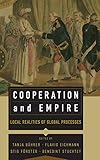Cooperation and Empire : Local Realities of Global Processes / ed. by Flavio Eichmann, Tanja Bührer, Benedikt Stuchtey, Stig Förster.
Material type: TextPublisher: New York ; Oxford : Berghahn Books, [2017]Copyright date: ©2017Description: 1 online resource (392 p.)Content type:
TextPublisher: New York ; Oxford : Berghahn Books, [2017]Copyright date: ©2017Description: 1 online resource (392 p.)Content type: - 9781785336096
- 9781785336102
- 325/.3 23
- JV105 .C68 2017
- online - DeGruyter
| Item type | Current library | Call number | URL | Status | Notes | Barcode | |
|---|---|---|---|---|---|---|---|
 eBook
eBook
|
Biblioteca "Angelicum" Pont. Univ. S.Tommaso d'Aquino Nuvola online | online - DeGruyter (Browse shelf(Opens below)) | Online access | Not for loan (Accesso limitato) | Accesso per gli utenti autorizzati / Access for authorized users | (dgr)9781785336102 |
Frontmatter -- Contents -- Figures and Tables -- Introduction. Cooperation and Empire: Local Realities of Global Processes -- Part I Case Studies -- Chapter 1 Caciques: Indigenous Rulers and the Colonial Regime in Yucatán in the Sixteenth Century -- Chapter 2 Connecting Worlds: Women as Intermediaries in the Portuguese Overseas Empire, 1500–1600 -- Chapter 3 Cooperation and Cultural Adaption: British Diplomats at the Court of the Nizam of Hyderabad, c. 1779–1815 -- Chapter 4 Local Cooperation in a Subversive Colony: Martinique 1802–1809 -- Chapter 5 Uncle Toms and Kupapas ‘Collaboration’ versus Alliance in a Nineteenth- Century New Zealand Context -- Chapter 6 ‘Collaboration’ or Sabotage? The Settlers in German Southwest Africa between Colonial State and Indigenous Polities -- Chapter 7 Chieftaincy as a Political Resource in the German Colony of Cameroon, 1884–1916 -- Chapter 8 Cooperation at its Limits: Re-Reading the British Constitution in South Africa -- Chapter 9 Key Alliance? ‘Native Guards’ and European Administrators in Sub-Saharan Africa from a Comparative Perspective (1918–1959) -- Chapter 10 The Cooperation between the British and Faisal I of Iraq (1921–1932) Evolution of a Romance -- Chapter 11 Collaborating on Unequal Terms: Cross-Cultural Cooperation and Educational Work in Colonial Sudan, 1934–1956 -- Part II Concluding Essays -- Chapter 12 Indigenous Agents of Colonial Rule in Africa and India: Defining the Colonial State through its Secondary Bureaucracy -- Chapter 13 Indigenous Cooperation: Foundation of Colonial Empires or New Historical Myth? -- Index
restricted access online access with authorization star
http://purl.org/coar/access_right/c_16ec
While the study of “indigenous intermediaries” is today the focus of some of the most interesting research in the historiography of colonialism, its roots extend back to at least the 1970s. The contributions to this volume revisit Ronald E. Robinson’s theory of collaboration in a range of historical contexts by melding it with theoretical perspectives derived from postcolonial studies and transnational history. In case studies ranging globally over the course of four centuries, these essays offer nuanced explorations of the varied, complex interactions between imperial and local actors, with particular attention to those shifting and ambivalent roles that transcend simple binaries of colonizer and colonized.
Mode of access: Internet via World Wide Web.
In English.
Description based on online resource; title from PDF title page (publisher's Web site, viewed 25. Jun 2024)


